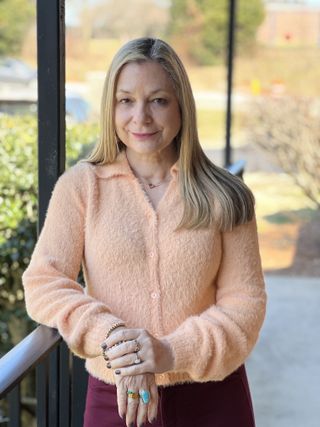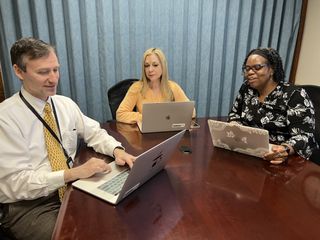Mary Decker, Associate Director of Schools for Teaching & Learning, Franklin Special School District, Tennessee
Franklin Special School District’s overall approach to sustainable technology implementation during the pandemic is an exceptional model because it involves best practices around equity as well as high-quality technology tools and instructional resources.
The district created a sustainable technology infrastructure that ensured technology access for all students via the device management and refreshes, flexible learning spaces, and robust, scalable networks. Wireless access was made available in all classrooms and Cat6 wire was installed in all school remodels, making every room a potential virtual learning studio. Mary Decker, Associate Director of Schools for Teaching & Learning, coordinated the innovative efforts.
“I am most proud of our consistent implementation of high-quality instructional materials,” says Decker. “We began the work around HQIM in earnest in 2019 because we believed in the research-based extremely positive impact such resources would have on student learning and on equity. We could never have anticipated just how much HQIM would support that learning during these extraordinarily challenging past two years.”
With the emergence of COVID-19 and extended school closure, technology—including a district-provided device for every student and hotspots for those in need—was instantly deployed via car pickup lines at schools and bus drop-offs to neighborhoods. When the 2020-21 school year began, the district embarked on another new frontier by offering parents the choice of virtual or in-person learning. For virtual learners, an education equal to that of in-person students was imperative.
“So soon after the extended closure of spring 2019, not all parents were ready to send their child back to a school building. At that point in time, there was great uncertainty and to a certain extent, fear,” says Decker. “It was very important to us to effectively meet the needs of every student and family, whether those needs were related to physical or emotional health, or both. We already had our HQIM in place, all with digital components. Virtual students had access to all of these resources along with the use of Google Classroom and Zoom.”
Nominate someone for the Tech & Learning Innovative Leader Award here
Supporting Teachers to Support Students

Decker and her team also ensured teachers charged with running the virtual classrooms had every tool necessary to stay on track with their in-classroom counterparts.
“Virtual teachers were provided ongoing professional learning and collaboration opportunities, with targeted support from district administrators,” says Decker. “They used district-created pacing guides to maintain the same scope and sequence as in-person teachers. They were also provided with their choice of technology tools including a headset, document camera, ring light, or second monitor. In the elementary grade levels, virtual teachers taught only virtual students.”
Focusing on the Big Goal
At FSSD, each pupil in the district uses the same tech.
“Years of focus on the implementation of and support for high-quality instructional resources and technology developed a laser-like focus on one question: What is best for students?” says Decker. “The invaluable nature of these strategies encompasses lessons learned that will inform future innovation. We are so proud of our incredible teachers, staff, administrators, board, families, and of course, students. Even throughout the most unusual and difficult of times, everyone banded together and never lost sight of our absolute priority: Doing what is best for students.”
Exciting Things in the Wings
After accomplishing so much under such trying circumstances, Decker doesn’t miss a beat in reaching higher for the future.
Decker says, “Dream plans to which I aspire include increasing all students’ proficiency and growth in math and ELA on the state assessment every year, with specific attention to our English Learners and students with disabilities, advancing our work around student advocacy so that every student is well-served in this regard, and ensuring that each student and staff member feels a sense of belonging in our district.”


